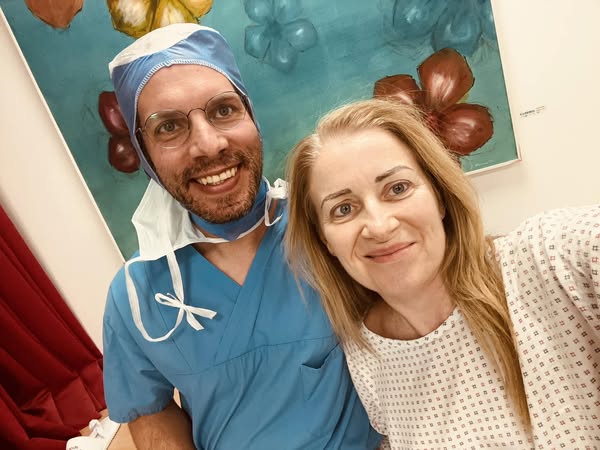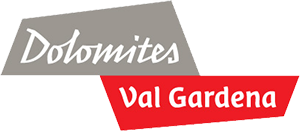A ski crash that changed everything – and a clinic that helped her find the way back
Valentina Lo Surdo – musician, presenter, and passionate hiking reporter from Rome – shares her ski accident experience with great sensitivity. She speaks openly about the thoughts that accompanied her and how, at the Dolomiti Sportclinic, she found not only medical care but also renewed hope. Honest, heartfelt and full of small but valuable tips for others going through similar situations.

In the picture: Ms. Lo Surdo with surgeon Dr. Barbetta
Experience with the injury and the decision to undergo surgery
- Can you tell us how your ski accident happened?
In the very first hour of my ski holiday, I was hit from behind by another skier. It was 10 o’clock in the morning and I was skiing gently down the Brancia slope in the San Cassiano area. I didn’t notice anything – suddenly I was thrown backward into the air and hit my head hard. Fortunately, I was wearing a helmet. The impact was so strong that I didn’t immediately realize my real injury was to my knee: a torn left ACL, with damage to the collateral ligaments, meniscus and tibia. - What were your main concerns after the accident?
In such situations, you’re completely overwhelmed. One thing that’s always important: call the police. What helped me a lot was that I asked for the phone number of the man who ran into me. Luckily, he was honest: he stopped immediately, and since I was in shock and thought it wasn’t too bad, I signaled that he could go on. But in a last-minute instinct, I called out: “Hey, give me your number anyway – you never know!” Never underestimate what might have happened to you in a crash. Two young men called the toboggan rescue and the police, and with their help, I called the guy back – and he actually came back and took responsibility. - What led you to decide to have surgery right after the accident?
I was taken to the clinic in La Villa, that works with the Dolomiti Sportclinic. Dr. Pangallo looked at the MRI and, when he heard that I do walking reportages for work, he looked at me with real empathy and said: “My advice – get surgery now, and you’ll be done with it.” I had a lump in my throat – I didn’t think it was that serious. But even though I couldn’t hold back the tears, I didn’t hesitate. I was admitted to the clinic the very next day.
Experience with the clinic and medical staff
- How did you experience the time leading up to the surgery in our clinic? Were you afraid – and how did you deal with it?
It was my first real surgery, so of course I was nervous, as anyone would be. But I always tell people now: the fear is usually much worse than the reality. The staff is extremely well prepared and does everything to calm you down and ease your fears. And the surgeons perform these operations ten times a day – it’s routine for them, even if it doesn’t feel like that for you. - What was your impression of the medical and nursing staff?
I actually had fun! The nurses were fantastic – especially the wonderful Barbara, who accompanied me into the operating room. Her voice was so calming that I told her she could work in radio! I actually said that as I was already starting to fall asleep from the anesthesia… - How would you describe the care and support you received during your stay?
Everything was perfect. This kind of experience helps you understand something essential – how deeply human this profession is. People who work with pain every day have a huge impact on others’ lives. Despite all the hassle – insurance, logistics, stress – this journey taught me to appreciate so many things I used to take for granted.
In the second part of her story, Valentina Lo Surdo shares how she experienced her time in the clinic, what helped her most during recovery – and why she’s now able to look back on it with a smile.



